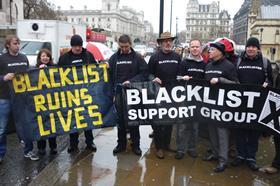Over four-fifths of people on construction blacklist remain unidentified almost five years after its discovery

More than four-fifths of the people on a construction blacklist remain unidentified almost five years after its discovery, it emerged this week.
The Information Commissioner’s Office (ICO) confirmed this week that 473 of the 3,213 individuals on the Consulting Association (TCA) blacklist - about 15% - had been identified. The ICO said it has not yet cross-checked information on “hundreds” still unidentified with the government, more than a year after this strategy was suggested.
The ICO seized the blacklist database from the offices of TCA - which served 44 construction firms - in February 2009 but has since cited the Data Protection Act in insisting that people who suspect they were on the blacklist contact the ICO to confirm this.
Under pressure from politicians, trade unions and campaign groups, the ICO agreed in May to send national insurance numbers on the blacklist to the Department for Work and Pensions (DWP) to compare with up-to-date records, a move first proposed by the GMB union in September 2012.
Earlier this month, eight major contractors - Sir Robert McAlpine, Balfour Beatty, Carillion, Costain, Kier, Laing O’Rourke, Skanska and Vinci - announced plans for a Construction Workers Compensation Scheme for victims of blacklisting named on the TCA blacklist, which will be developed on behalf of the firms by John Taylor, the former chief executive of mediation body Acas.
A spokesperson for the ICO said: “We are still waiting for DWP to be ready to receive [the information] but are hopeful that this will take place shortly.
“The DWP has agreed to go ahead given particular provisions. Some [files] will have mistakes in the national insurance numbers, which have to be looked into. Some of these records aren’t particularly accurate and are quite old.”
Chuka Umunna, shadow business secretary, said the delay was “disappointing” and said there seemed to be “a lack of urgency on the part of the ICO in reaching blacklisting victims”.
Shami Chakrabarti, director of campaign group Liberty, said: “The ICO needs to take steps to identify and notify victims without further delay.”
Why the secrecy?
By Will Hurst
The launch of a blacklisting compensation fund is a very welcome, if long overdue, step which may hold the key to resolving this bitter saga. Many of those on the blacklist held by the Consulting Association were robbed of their livelihoods and - as Building has consistently argued - the industry has to form a coherent response if it has any care for its long-term reputation.
But major questions remain. As Building reveals this week, the scheme was conceived and announced by eight contractors without consulting some of those most affected by the use of the blacklist.
The scheme’s backers also seem unwilling to communicate anything about it beyond a 250-word press release announcing the scheme’s launch, leaving workers in the dark about what they can expect. This is not a clever way to proceed.
The blacklisting scandal is all about secrecy. If the aim is to draw a line under it, contractors might want to at least try to show that their modus operandi has changed.




























No comments yet